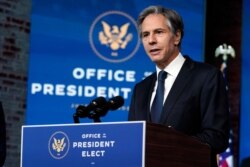U.S. President-elect Joe Biden discussed the coronavirus pandemic Wednesday and the “shared sacrifices” Americans are making ahead of Thursday’s annual Thanksgiving holiday.
Millions of Americans typically gather with family and friends, many traveling long distances to do so. But this year, with COVID-19 infections spiking across the country, the federal government has urged people to stay home for Thanksgiving, and many are. Even so, millions of people are ignoring the advice and crowding airports to head to destinations across the country.
Biden’s transition office said he would tell Americans “that we can and will get through the current crisis together.”
Ahead of the speech, his transition team said it was receiving “extraordinary receptions” from officials in the outgoing administration of President Donald Trump to help Biden take control of the U.S. government after his January 20 inauguration.
Trump, a Republican, acquiesced in the official start of Biden’s transition to power this week but has not conceded his defeat. However, election officials in key battleground states have declared the Democrat the winner, giving a Biden an unofficial 306-232 edge in the Electoral College that determines the outcome of U.S. presidential contests.
Biden adviser Kate Bedingfield told reporters, “The election is over. Everyone has accepted the outcome except President Trump and [Trump lawyer] Rudy Giuliani.”
Bedingfield said Biden transition officials were getting information from Trump officials about national security issues the country faces, along with plans for approval and distribution of prospective vaccines to inoculate millions of people against the coronavirus.
Biden and Trump have not spoken since the November 3 election, with Biden aide Jen Psaki saying, “We do not feel it is essential to talk with President Trump,” although Biden has said he would be willing to meet with the outgoing president.
WATCH: Biden picks his team
On Tuesday, Biden declared that the United States was “ready to lead the world, not retreat from it,” signaling a sharp pivot from Trump’s “America First” credo over the last four years.
Biden said the country was “ready to confront our adversaries, not reject our allies. And ready to stand up for our values.”
From his transition center in his hometown of Wilmington, Delaware, the president-elect introduced his top foreign policy and national security officials, including Secretary of State-designate Antony Blinken, a longtime Biden foreign affairs adviser.
Biden said his foreign policy team embodied “my core belief that America is strongest when it works with its allies. That’s how we truly keep America safe without engaging in needless military conflicts, and our adversaries in check and terrorists at bay.”
Under Trump, the United States often found itself at odds with longtime Western allies while the U.S. leader appeared at ease with such autocrats as Russian President Vladimir Putin, Turkish President Recep Tayyip Erdogan and North Korean leader Kim Jong Un.
Biden said, “America leads not only by the example of our power, but by the power of our example.”
Aside from Blinken, Biden named former Secretary of State John Kerry to a new position as special presidential envoy for climate, while giving him a seat on the National Security Council. It was a reflection, the Biden transition said, of the incoming president’s commitment to addressing climate change as an urgent national security priority.
Biden selected Alejandro Mayorkas to become head of the Department of Homeland Security. A Cuban American lawyer, he is a former deputy secretary at the agency. If confirmed by the Senate, he would be the department's first Latino and immigrant leader.
Biden picked former Ambassador Linda Thomas-Greenfield, an African American woman and a 35-year veteran of the U.S. Foreign Service who has served on four continents, as U.S. envoy to the United Nations. Biden elevated her role to a seat in his Cabinet, a rank past presidents have also occasionally given the high-profile position.
The president-elect chose another woman, Avril Haines, to become director of national intelligence. She is a former deputy director of the Central Intelligence Agency and a deputy national security adviser. She will be the first woman to lead the U.S. intelligence community if confirmed.
Jake Sullivan, a Biden foreign affairs adviser, was picked to become Biden’s national security adviser.







